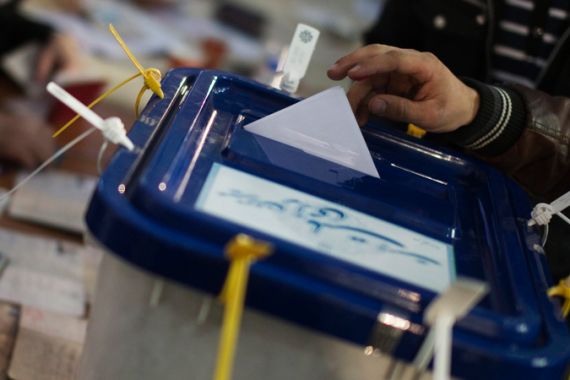Iran reports high turnout in parliament vote
Early results show victory for supporters of Ayatollah Ali Khamenei, with officials claiming 64 per cent voter turnout.

Iran has declared more than 64 per cent of eligible voters participated in Friday’s parliamentary elections, the country’s first vote since the disputed presidential elections in 2009 that ignited extensive protests.
Early unofficial results reported strong wins for supporters of Ayatollah Ali Khamenei, Iran’s supreme leader, over candidates close to President Mahmoud Ahmadinejad.
Mostafa Mohammad Najjar, the country’s interior minister, said the counting was still in progress, but that initial results showed 64.2 per cent public participation.
“With such participation, our people delivered a hard slap to the face of the enemy,” Najjar told state-run television.
No independent observers were on hand to monitor the voting or check the turnout figures.
International rights groups have criticised Tehran for increasing restrictions on freedom of expression and disqualifying many opposition candidates ahead of the poll.
Al Jazeera’s Dorsa Jabbari, reporting from Tehran, said the figure could rise as counting was still going on.
“They are hoping to set a new record, that would be the figure of 75 per cent, which was in 1996,” she said. “[The voter turnout] is extremely important for the establishment in this country…the turnout indicates how much support they have.”
In the absence of the reformists, whose leaders have remained under de-facto house arrest for protests, the election was seen by many as a contest among the increasingly fractured conservatives, divided along the lines of their support for the supreme leader or Ahmadinejad.
The relationship between the two leaders have deteriorated over the past couple of years, often resulting in public verbal clashes.
“It is essentially going to make life difficult for the president in his final year in terms of what he wants to push through the parliament. He has already had a lot of problems in the past with the legislative body,” our correspondent said.
“In terms of what it means for the ordinary Iranians, it will not change their lives that much. This has been an internal dispute between the ultra-conservatives and the supporters of President Ahmadinejad. What does change for them is that there will be a more hard-line conservative voice coming out of the Islamic republic than before.”
Opposition boycott
The semi-official Mehr news agency reported that Parvin Ahmadinejad, the president’s sister, failed to secure a seat in the parliament. She was running from the central town of Garmsar, the hometown of Ahmadinejad.
Ali Larijani, the current speaker of parliament, has retained his seat in Qom, according to initial results.
Authorities delayed the end of voting on Friday by five hours in order to allow more people to cast ballots.
Facing economic turmoil and high unemployment at home, and international pressure over the country’s nuclear programme, the Islamic Republic’s conservative leaders called on people to vote for the “security of the country”, while reformists who accused authorities of fraud in 2009 called on their supporters to boycott.
Iranian opposition leaders and former presidential candidates Mir-Hussein Mousavi and Mehdi Karroubi have both been under house arrest for over a year. Other reformists have called for a boycott, leaving the pool of 3,400 candidates mostly to the conservatives.
Reyhane, 25, and an opposition supporter, told the AFP news agency: “The outcome is predetermined. It’s of no difference if I vote or not. I learned this from the previous election, when our votes were stolen.”
The vote will probably have little impact on Iran’s foreign or nuclear policies, on which Khamenei already has the final say, but could strengthen the supreme leader’s hand before the presidential vote next year.
Ahmadinejad, 56, cannot run for a third consecutive term.